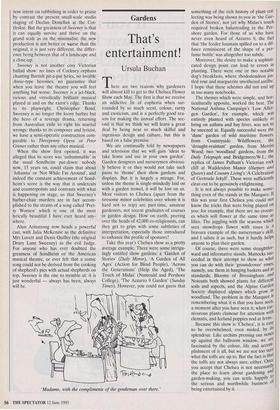Theatre
Leonardo: A Portrait of Love (Strand) Sweeney Todd (Cottesloe)
The great and the grim
Sheridan Morley
On the Morley/Richter scale of truly disastrous stage musicals, Leonardo: A Por- trait of Love at the Strand (or Leonard the Musical, as I prefer to think of it, given the defiantly suburban English nature of the casting here) only rates about a five. No scenery crashes to the ground, no actor rushes on stage to announce that Mona is looking pretty damn inscrutable again this morning, and only very occasionally do they suggest that she might have been a man in drag, given da Vinci's sexual uncer- tainties.
But not even in the great days of the Hollywood Art Class, when Kirk Douglas was hacking off his ear as Van Gogh and Charlton Heston was up there on the lad- ders fixing the Sistine ceiling, did anyone even think about a life of da Vinci, so uneventful was it, and the Moeller broth- ers, who are the prime creators of the musical, have the same inertia problem. Nothing happens in the first act of Leonar- do, and then it happens all over again in the second.
A large cast appears to have had a com- munal charisma bypass in rehearsal, while the actor in the title role, Paul Collis, seems to have won a weekend in 15th- century Florence as a prize on a painting- by-numbers correspondence course. For the crowd scenes, several merrymaking Peasants have been drafted in from a Palla- dium pantomime circa 1954, while the songs are of the kind you forget even while they are still being sung.
The result is a kind of Mona Lisa jigsaw for which several of the pieces seem to have been left out of the box. It has all the electric fascination of watching paint dry, and all the vibrant theatricality of a demo disc for a school concert: but the budget has been raised on Naura, an island rich in bird-droppings, so they must be used to this kind of thing.
Attend the tale of Sweeney Todd: he served a dark and a hungry God. When Sondheim's bleak, black, masterly musical first opened on Broadway back in 1979 it did so in a huge Hal Prince production (also seen here at Drury Lane a year or so later), which most of my colleagues are
now intent on rubbishing in order to praise by contrast the present small-scale studio staging of Declan Donellan at the Cot- tlesloe. But the greatness of Sweeney is that it can equally survive and thrive on the grand scale as on the minimalist: the new production is not better or worse than the original, it is just very different, the differ- ence being between that of a landscape and a close-up.
Sweeney is not another cosy Victorian ballad show: no lines of Cockney orphans chanting Bartish pit-a-pat lyrics, no lovable Annie-type heroines, no guarantee that when you leave the theatre you will feel anything but worse. Sweeney is a jet-black, vicious and vitriolically brilliant musical played at and on the razor's edge. Thanks to its playwright, Christopher Bond, Sweeney is no longer the loony barber but the hero of a revenge drama, returning from Australian exile to right his marital wrongs: thanks to its composer and lyricist, we have a semi-operatic construction com- parable to Threepenny Opera or Peter Grimes rather than any other musical.
When the show first opened, it was alleged that its score was 'unhummable' in the usual Sondheim put-down: nobody now, 15 years on, could claim that about `Johanna' or 'Not While I'm Around', and indeed the constant achievement of Sond- heim's score is the way that it undercuts and counterpoints and contrasts with what is happening on stage, so that Sweeney's barber-chair murders are in fact accom- plished to the strains of a song called 'Pret- ty Women' which is one of the most lyrically beautiful I have ever heard any- where.
Alun Armstrong now heads a powerful cast, with Julia McKenzie as the definitive Mrs Lovett and Denis Quilley (the original Drury Lane Sweeney) as the evil Judge. For anyone who has ever doubted the greatness of Sondheim or the American musical theatre, or ever felt that a comic song could not be derived from the cooking of shepherd's pies with actual shepherds on top, Sweeney is the one to tremble at: it is just wonderful — always has been, always will be.



































































 Previous page
Previous page